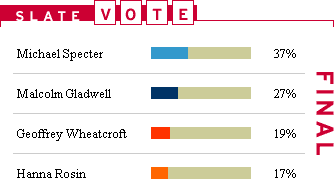Michael Specter Wins the Slate Hackathlon
Michael Specter Wins the Slate Hackathlon
The readers have voted, the ballots have been counted, and the judges have crowned Michael Specter, a Moscow correspondent of the New York Times, the winner of the first Slate Hackathlon. More than 1,400 votes were cast in the four events. Here's the final breakdown, by percentages:

We contacted Specter to offer our congratulations and ask how he feels about winning the first Hackathlon. "I'm far too overwhelmed with emotion to rely on mere words," he e-mailed back. "Also, I can't really write anything anymore unless you give me two hours and a cheat sheet."
Specter has a reputation for being a sore winner that he bolstered during the Hackathlon. Although he led the contest from the beginning, he obviously took no joy in his success. Instead, he repeatedly accused his hack protégé, Malcolm Gladwell, of cheating by writing parody, which was prohibited under the rules, and filled the Hackathlon referee's e-mail box with his whining.
Specter will return next fall to defend his title against three new challengers.
_______________________________________
Who's the fairest hack in all of journalism? With your help, we hope to settle that question with the first Slate Hackathlon.
We've invited four of our favorite hacks to compete in four weekly journalistic events designed to showcase journalistic glibness, intellectual sleight of hand, greed under pressure, and a total disregard for what the rest of the world thinks. Actually, our four contestants have already demonstrated their disdain for what others might think by accepting the Hackathlon challenge.
Our Hackathletes are Malcolm Gladwell of The New Yorker; Hanna Rosin of the New Republic; Michael Specter, a Moscow correspondent for the New York Times; and Geoffrey Wheatcroft, author of The Randlords and a contributor to British publications too numerous to mention. (For more on the hack ethic, click
The four weekly events are: an op-ed in the style of the New York Times (750 words or thereabouts); a New Yorker "Talk of the Town" piece (750 words or thereabouts); the first 1,000 words of a Vanity Fair profile; and a breaking news story (750 words or thereabouts).
The subject of their hackwork will remain a mystery to all until the weekend of the competition, when Slate will e-mail the Hackathletes the assignment and a cheat sheet of facts, figures, and quotes from which they can crib. The cheat sheet will be posted for readers' inspection. The Hackathletes may not make up quotations (sorry, guys). They may take no more than two hours to complete the assignment. They may, if they so desire, do additional research. But they shouldn't. As a great hack once said, the essence of hackery is "adjusting a minimum of information to produce the maximum journalistic effect." (The only editing Slate has done to the pieces is a quick spell check.)
The winner of the Hackathlon will be determined by an online vote of Slate's readers. Readers may vote once in each of the four events. The Hackathlete who polls the greatest total will be declared the winner and will return next year to face three new challengers.
| EVENT 4--DEC. 3, 1997 A Breaking News Story in the Washington Post The Hackathletes were given two hours to write the first 750 words of a breaking news story in the Washington Post about a possible scandal involving Newt Gingrich. A "cheat sheet" of contrived facts and quotations was provided as background for this story. The Washington Post Breaking News cheat sheet |
Hackathletes, to your marks!